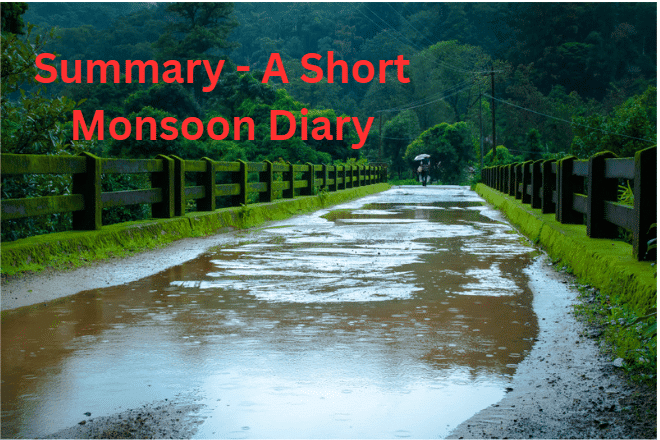A Short Monsoon Diary Summary Class 8 English Honeydew Chapter 7
| Table of contents |

|
| Key Points of the Story |

|
| Detailed Summary |

|
| Theme/Message |

|
| Difficult Words |

|
“A Short Monsoon Diary” invites us into the heart of Mussoorie, where Ruskin Bond captures the essence of the monsoon with poetic beauty. Each entry reflects his admiration for the wonders of nature. Let's learn more about this in detail.

Key Points of the Story
- A Short Monsoon Diary gives us a glimpse of the diary written and maintained by Ruskin Bond.
- A diary is a record of personal experiences written day after day over a long period of time.
- In his diary, Ruskin Bond wrote about the silent miracles of nature as the mountains receive monsoon showers.
- The monsoon season in Mussoorie begins around the last week of June and continues till the end of August.
- The cold rains are welcomed in October till the last darkest cloud in March which renders the sky clear for the rainbow after it hails.
 The Icon of Indian Literature
The Icon of Indian Literature
Detailed Summary
In this chapter, are the extracts from the diary of the famous author and nature lover Ruskin Bond. The author describes the flora and fauna during the monsoon in Mussoorie. He wrote the experiences day-wise.
24th June
It is the first day of the monsoon mist. The mist has covered the hills and also quietened the birds. He can hear Bijju calling his sister and feel that he is running. However, due to mist, he is unable to see Bijju. The author says that the mist has changed the Mussoorie hills in two ways. Firstly, one can not see the hills and secondly can not hear the birds chirping.
25th June
The rain is warm and humid and is thus comfortable, unlike the winter rain. The flowers are blooming. He describes the hill station as ‘A Paradise that might have been’.
27th June
One can see leeches appearing due to the monsoon. A leopard was also seen stealing dogs and other animals. Some new birds like minivets can also be seen. Minivets are bright coloured birds and sit silently among the leaves. One can also see some seasonal flowers blooming.
2nd August
It has rained all night. The sound of the rain on the tin roof delights him. He feels he is untouched yet is in touch with the rain.
3rd August
The rain stops and there is sunshine. Animals, birds, and humans are all out in open sunshine. The author is pleased to hear a song of a whistling thrush coming from a distance.

12th August
He writes that it is been raining non-stop for more than a week. Everything is damp but not cold. Flowers have covered the hills. If one needs to go out, he needs to carry an umbrella.
31st August
On this day, monsoon growth can be seen everywhere. The seeds of the cobra lily are becoming red which is an indication that the rains are coming to an end. Snakes and rodents have taken shelter in attics, roofs, and godowns as the holes are full of rainwater.
3rd October
This year the monsoon was much longer than usual. Usually, it starts in the last week of June and continues until the end of August. Now, the winter rain has begun.
26th January
The author wrote a poem about winter rain. He says that the winter rain makes him feel lonely as a friend who was staying with him has left. He also says that there are no flowers in winter rain as there were in monsoon rains.
23rd March
It is the end of winter. One can see a rainbow in the clear sky after a hailstorm.
 A Glimpse of the Monsoon's Beauty
A Glimpse of the Monsoon's Beauty
Theme/Message
The theme of "A Short Monsoon Diary" by Ruskin Bond revolves around the beauty and impact of the monsoon season on nature, particularly in Mussoorie. Through his diary entries, Bond captures the essence of the monsoon, portraying it as a time of renewal and transformation in the natural world. He highlights the silent miracles of nature, such as the blooming of flowers, the appearance of new birds, and the growth of seeds. The diary also reflects Bond's deep connection with nature, as he finds joy and solace in observing the changes brought about by the monsoon. Overall, the story conveys a message of appreciation for the beauty of nature and the need to preserve and cherish it.Difficult Words
- Melancholy– very sad (the mist is called melancholy because it makes people feel melancholy)
- Conceal– not allow to be seen; hide
- Cobra lily– common name of several plants
- Heralded– announced or brought the news of
- Imprecations– curses
- Leeches– an aquatic or terrestrial annelid worm with suckers at both ends. Many species are bloodsucking parasites
- Bloodletting– losing blood (decades ago, leeches were used to remove blood from a patient’s body)
- Scarlet minivets– bright red bird like a cuckoo
- Flitting– move swiftly and lightly
- Contrive– manage to do something
- Drongos– a song bird with a stout bill
- Creeper– any plant that grows along the ground, around another plant, or up a wall by means of extending stems or branches
- Snapping up- to take someone or something quickly or eagerly
- Dearth– a scarcity or lack of something
- Insectivorous– (of an animal) feeding on insects, worms and other invertebrates
- Drumming– falling noisily
- Corrugated– (of a material or surface) shaped into a series of parallel ridges and grooves so as to give added rigidity and strength
- Swish– move with a hissing or rushing sound
- Disconsolately– unhappily
- Thrush– a small or medium-sized songbird, typically having brown back, spotted breast and loud song
- Ravine– valley
- Bobbing-make a sudden move so as to appear or disappear
- Lush– (of vegetation, especially grass) growing luxuriantly
- Landour– a small cantonment town touching Mussoorie
- Crevices– narrow openings or cracks in rock or wall
- Burrows– a hole or tunnel dug by a small animal, especially a rabbit, as a dwelling
- Attics– a space or room inside or partly inside the roof of a building.
- Shrew– a small insectivorous mammal resembling a mouse, with a long pointed snout and tiny eyes
- Blunders– act clumsily
- Admonishes– warn or reprimand someone firmly
- Chuchundars– hindi word for shrew
- Suffused– gradually spread through or over
- Hushed– very quiet and still
- Drenched– wet thoroughly; soak
- Caress– touch gently
|
32 videos|317 docs|56 tests
|
FAQs on A Short Monsoon Diary Summary Class 8 English Honeydew Chapter 7
| 1. What are the key observations made by the author during the monsoon season in "A Short Monsoon Diary"? |  |
| 2. How does the author describe the impact of monsoon on daily life in the diary? |  |
| 3. What literary devices are used in "A Short Monsoon Diary" to enhance the narrative? |  |
| 4. What emotions does the author express in the diary regarding the monsoon? |  |
| 5. How does "A Short Monsoon Diary" reflect the theme of nature's beauty and challenges? |  |



















